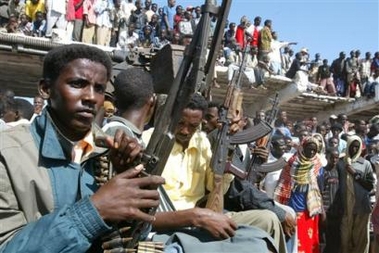U.N. Security Council ignored recommendations for targeted sanctions and a
tighter existing arms embargo in Somalia, despite a spike in violence and fears
that Islamic fundamentalists have gained strength in the chaotic nation.

Gunmen keep guard as thousands of people
gather to listen to the speaker of the Somali parliament, Shariif Hassan
Sheikh Aden in this Sunday, Feb. 6, 2005 file picture in Mogadishu,
Somalia. Islamic militiamen and secular fighters battled Wednesday May 10,
2006 for control of Somalia's capital despite promises of a cease-fire, as
the death toll rose to at least 96, with nearly 200 others wounded.
[AP] |
The recommendations Wednesday had come
from one of the council's own committees, which warned that warlords in Somalia
routinely violate the current arms embargo and have enriched themselves by
selling fishing licenses and exporting charcoal.
The council committee said in a report that the influence of the Islamic
fundamentalists was great now that they are a "third force" on par with the
transitional government and an alliance of groups in the capital, Mogadishu.
Those fundamentalists have gained the "backing and military capability to be
a credible contender for power in Somalia," the committee said.
The report came as secular warlords and Islamic extremists clashed for a
fourth day in Mogadishu. At least 96 people have been killed in the escalating
violence.
The fighting has intensified steadily since Sunday, when the Islamic
militants, who have alleged ties to al-Qaida, and the warlords took up strategic
positions in Mogadishu.
Most victims in the recent fighting have been civilians caught in the
crossfire. Nearly 200 people have been wounded in the violence, doctors say.
The Security Council passed a resolution Wednesday urging all nations to
adhere to the existing arms embargo in Somalia and asked U.N. Secretary-General
Kofi Annan to re-establish a monitoring group to investigate violators and
make recommendations on how to improve compliance.
The resolution ignored recommendations from the committee that the council
impose travel bans and asset freezes against some Somali warlords.
Some ambassadors said they would keep up pressure for sanctions.
"The situation is deteriorating so I think it's important that we continue to
press the sanctions, and we're trying to target them and have an effect on a
place that has no functioning government," Deputy U.S. Ambassador Jackie Sanders
said.
The resolution also refused to address calls for two economic embargoes: one
on Somali charcoal, which is environmentally destructive and enriching the
warlords; and another to ban the export of fish from Somali waters, which are
caught by foreign vessels that pay the warlords expensive licenses.
"In our discussions we called upon everybody to observe arms embargo, and if
things continue that way maybe tougher measures will need to be taken," Russian
Ambassador Vitaly Churkin said.
Somalia has had no effective central government since 1991, when warlords
ousted longtime dictator Mohamed Siad Barre and then turned on each other ¡ª
carving this nation of an estimated 8 million people into a patchwork of
anarchic, clan-based fiefdoms.
Islamic fundamentalists have portrayed themselves as an alternative capable
of bringing order and peace, but they have not hesitated to use force and have
allegedly linked up with al-Qaida terrorists. Rumors abound that the United
States is backing an alliance fighting them.